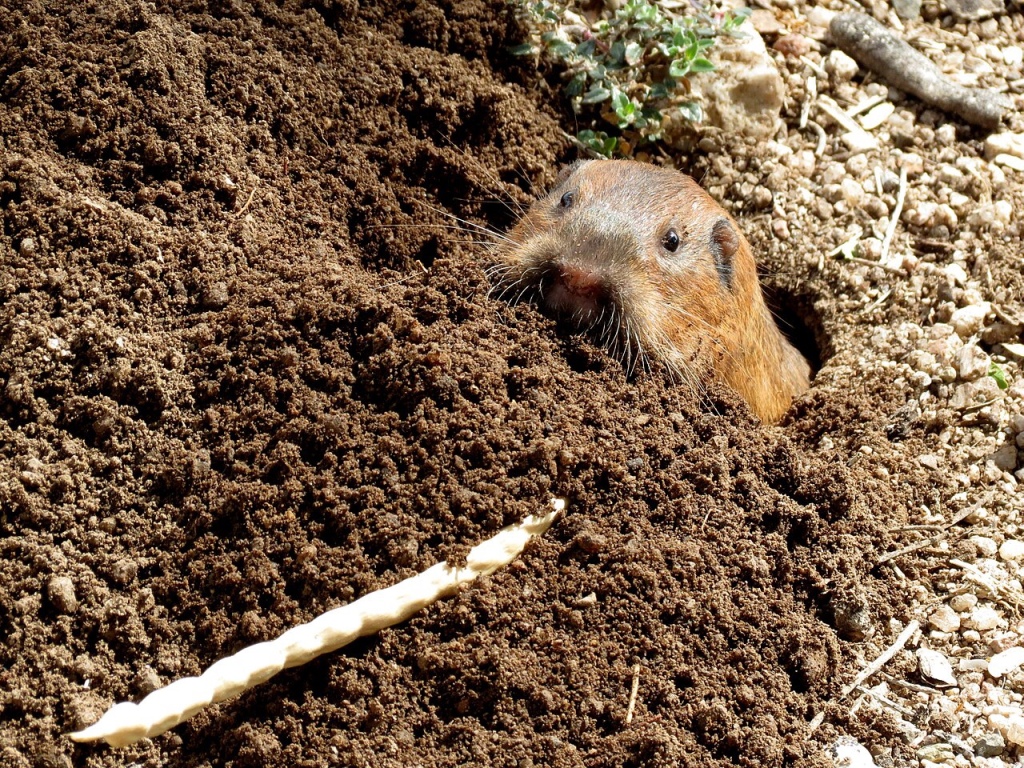Modern humans are widespread. We inhabit the frozen north of the Arctic, lush rainforests at the Equator, arid deserts and everything in betweeen. There’s even people living exclusively at sea.
Many factors have played a role in ensuring the success of our species. But one that’s essential is agriculture. Non-agricultural societies usually harbour groups in the hundreds. Societies that eat wheat, rice or corn support millions. This is because agriculture is a technology that supercharges the caloric potential of what we eat, allowing a singe square foot to support exponentially more people after it’s been cultivated than before. With agriculture, we become the masters of our environment.
But we might not be the only animals that farm. At least that’s the conclusion of a newly released study in the journal Cell.
What Non-Human Farming Looks Like
The southeastern pocket gopher is restricted to dry, sandy soils in Georgia, Alabama and Florida, and lives exclusively on plants such as roots, grasses, and shrubs. Human cultivation has intruded on many of the ecosystems that the gopher used to call home.
Yet it, too, seems to cultivate the land. Only it does so underground.
Its long and deep burrows allow it to easily nibble on roots and promotes plant growth. This is done by circulating air underground, increasing the oxygen in the soil, and consequently, the nutrition in the plants. Plants are, in other words, changed by the actions of these small rodents. And the roots of plants grow freely in the tunnels, giving the gopher as much as 20 % of its daily caloric intake.

Some biologists are sceptical, however. Gophers don’t cultivate plants in the same intentional way as humans. They argue that it requires too much imagination and semantic stretching to make them fit the moniker of farming.
Even so, gophers aren’t the only non-mammals that cultivate plants. Some ants and beetles have also adopted the technology — and their practice is a lot closer to human agriculture than that of the gophers.
Agriculture Is Older Than You Think
But first, let’s consider origins. If you take any course on the origin of the state, civlization, cities, or basically any other large-scale construct that we take for granted in our everyday lives, chances are you’ll be told that the neolithic (or agricultural) revolution was the essential turning point that allowed humans to gather in large groups and essentially kickstart human history.
And you’ll also be told that farming, the technology behind the neolithic revolution, emerged in the Middle East some 12,000 years ago. The key word here is emerged. Because that’s simply flat out wrong.
Consider the leaf-cutter ant. It lives in South America and for the past 50 million years it’s been carrying dead leaves across the rainforest and ito dark, damp, and isolated homes. Curiously, the ants don’t eat these fallen leaves. Rather, they use these leaves to fertilize fungus, an essential food source for their larvae. And this is not some weird, isolated incidence. More than 250 different species of ants practice this kind of fungal farming.

And it’s very complex. Like human agricultural societies, they have highly stratified social orders, with different classes and roles. And just like human wheat, rice, and barley, ant fungus cannot survive in the wild or reproduce with other wild species. It’s entirely dependant on the gardens where it’s cared for by the ants.
And it’s not just ants. Some beetles too, are farmers. Pastoralism (herding animals)? Well, ants beat us to that as well.
Middle Eastern farmers 12,000 years ago were not aware of the ways that ants and beetles subsist on cultivated fungus and live in highly stratified societies as a result. This would make the advent of farming an interesting case of convergent evolution — that is, a survival strategy adapted independently across species.
Consequently, I would argue, this casts the history of farming and, indeed, human history as a whole, in a different light.
Changing the Story of Humankind
Let me start by stressing that acknowledging the simple fact that insects beat us to inventing farming doesn’t subtract anything from the role of farming in human history. It’s still an invention that fundamentally changed humanity and our relationship with our environments. But it does suggest that maybe humans aren’t quite as unique as we like to think.
Studying within the humanities, I know that we humans are often unnecessarily anthropocentric. After all, I’m studying within a field that until quite recently found the idea that anybody other than humans were worth studying to be preposterous. And in some ways, I feel this legacy is still carried with us today.

But it’s not just farming that isn’t unique to humans. The social stratification and strategy of humanity is also present with ants, and others have pointed out that the neuron-to-brain-size ratio (which is what makes us so intelligent!) isn’t unique to humans. And chimpanzees seem to have far better memory than we do. Nor is tool use specifically human, and even intentional fire-use, the technology that allowed the evolution of our high intelligence, predates our species.
In fact, I don’t think there’s any one trait that humans possess uniquely within the animal kingdom. If there’s one thing biology has taught us, it’s that we’re far from as unique as we thought.
But there is one thing that sets us apart, at least to my knowledge: we’ve been incredibly efficient with our time. As a recently young species, it’s impressive that we’ve managed to settle basically every single ecosystem on Earth and fundamentally changed the face of our planet. We might not be the only ecosystem engineers around, but we’re definitely the most rapidly destructive ones.
This effectiveness merits responsibility. A responsibility we’ve been reluctant to meet. If we truly are more efficient and destructive than other species, then it rests on our shoulders to cultivate our planet. If we don’t take up the mantle, nobody else can.

Leave a comment